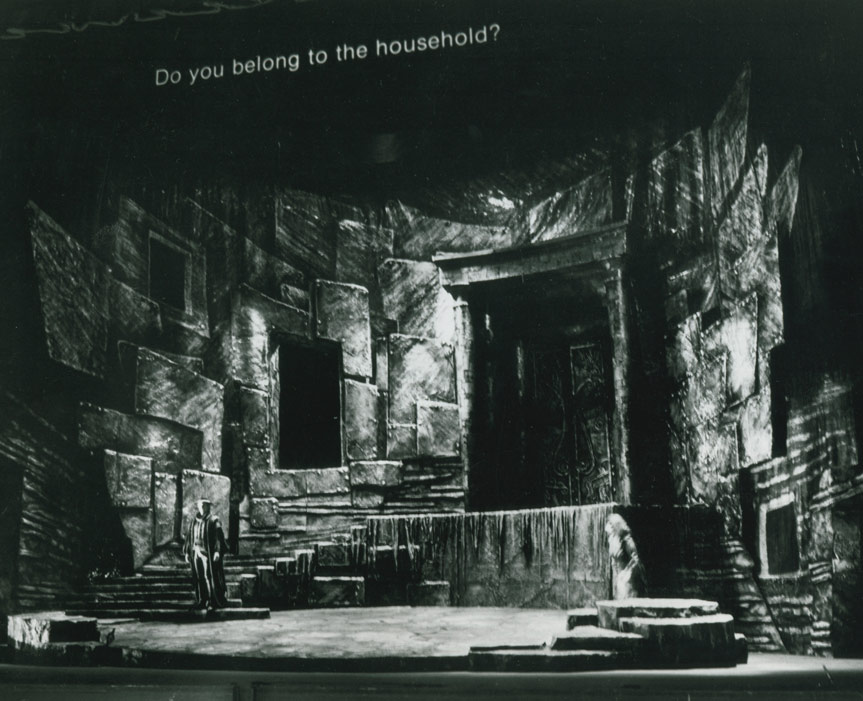-
Get to Know: Amplified Opera’s Aria Umezawa
By COC StaffPosted in Disruptor in Residence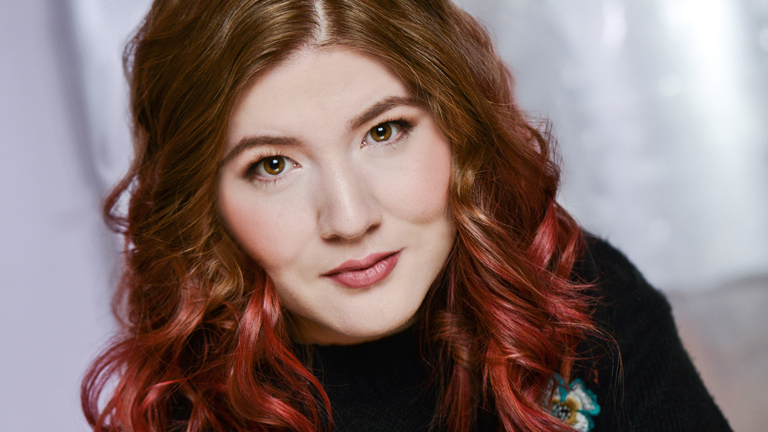
Interview with Aria Umezawa
Co-founder of Amplified Opera
Over the course of the next few months, we’ll be sharing insightful Q&As with the co-founders of Amplified Opera, the COC’s Disruptor-in-Residence. To learn more about the company and its new residency, click here.
Join Aria and the co-founders of Amplified Opera in our upcoming digital roundtable COC in Conversation: Gender & Opera –– March 5, 2021 at 7 p.m. ET.
What inspired you to form Amplified Opera?
My colleagues inspired Amplified Opera. Not just the co-founders of AO (Teiya Kasahara, Marion Newman, and Asitha Tennekoon), all of whom are the very definition of extraordinary, but my colleagues in the industry at large. In forming AO with the rest of the team, I hope to add volume to some of the amazing art and ideas that are being voiced in this industry, and the amazing artists who are voicing them.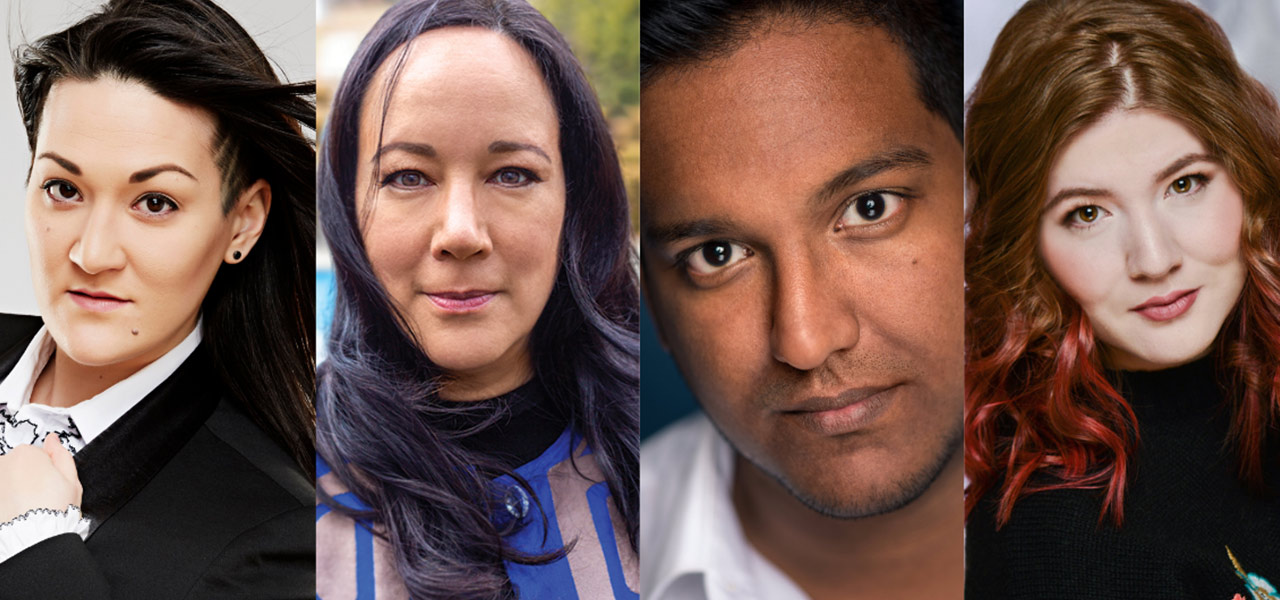
The co-founders of Amplified Opera (Teiya Kasahara, Marion Newman, Asitha Tennekoon and Aria Umezawa).
How did opera come to be part of your life?
As my name might suggest, both my parents are musical and value creativity and expression. So, I really can't remember a time when music and art weren't a part of my life. I grew up in Toronto and have vivid childhood memories of Dream in High Park, the free concerts at Harbourfront Centre, and weekends at the Art Gallery of Ontario.
When it comes to opera specifically, at the risk of sounding toady, at least partial credit has to be given to the Canadian Opera Company. When I was in elementary school, the COC would offer discounted tickets to schools to attend their final dress rehearsals. My music teacher, Mrs. Stanfield at Howard P.S., would always buy a block. She would draw these comic strips depicting the plots of each opera and present them to our class so we would know what was going on. Additionally, one of my best friends growing up was the daughter of Gunta Dreifelds - the SURTITLESTM producer at the COC. Gunta would bring us to performances at the Hummingbird Centre (as it was known back then) and let us sit in the booth with her. When I would go over to their house to play, I remember seeing stacks of operatic scores on Gunta's desk. I used to be in total awe of how many languages she spoke. So, long before I hit double digits in age, I had decided that I wanted to work in opera.A scene from Elektra (COC, 1983), photo: Michael Cooper. The first time SURTITLESTM were used on stage.
In high school, I attended the Claude Watson arts program at Earl Haig S.S. As music majors, my classmates and I participated in workshops at Opera Atelier (I can still remember a particularly lively presentation by Marshall Pynkoski), attended Tapestry Opera productions (the one that sticks out was the premiere of Christos Hatzis' Constantinople), and for extra credit in my graduating year I took part in The Ruders Project, which was a collaboration between the COC and Soundstreams around the Canadian premiere of The Handmaid's Tale. I composed a piece that was workshopped by Poul Ruders and presented at the Glenn Gould Studio. I already knew I wanted to work in opera, and by the time I was ready to head off to university, I had a good sense of all that opera could be.
All of this is just a long-winded way of explaining that I feel I am a true testament to the amazing work of the arts and culture sector in Toronto and am deeply grateful for everything I was able to experience as a result of growing up in this city.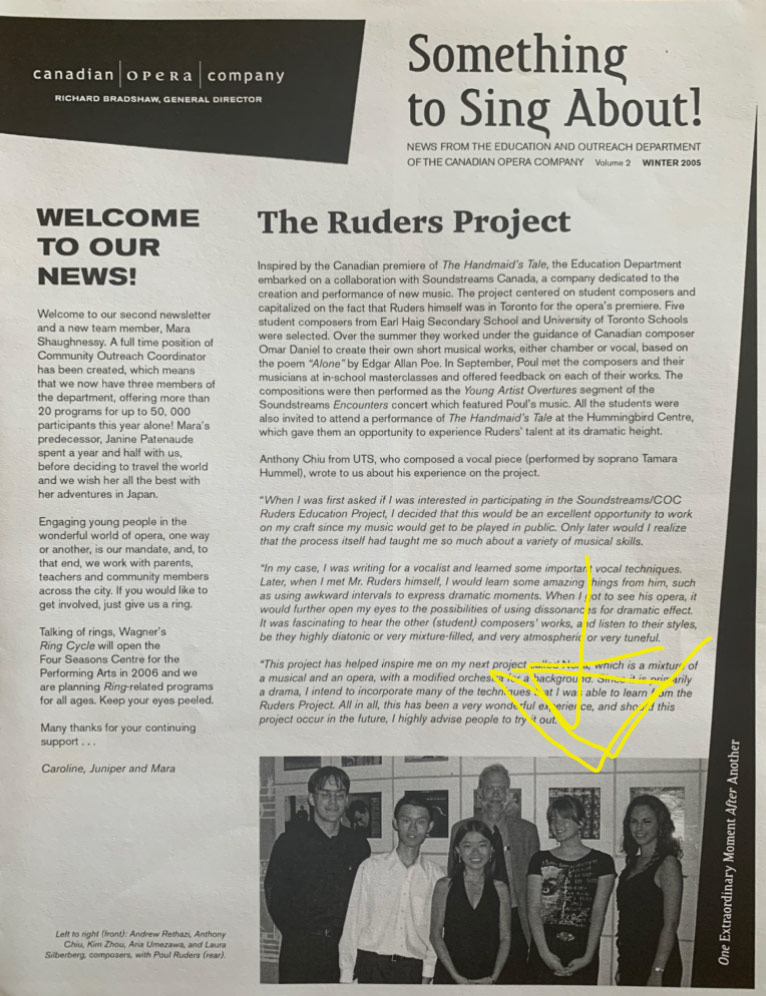
Aria featured as part of the COC's Ruders Project in 2005.
What do you love most about opera?
A student at McGill (whose name is, unfortunately, escaping me at the moment) once said to me, "How much better would we be as a society if we could learn to listen to life's Leitmotifs?" They meant that we are not very good at listening to each other or picking up on the themes that illuminate what individuals and communities are grappling with.
At a time when so many people are struggling to be heard and understood, opera is an art form that encourages us to listen not just to what is being said, but to the music behind the words. When opera is at its best, it's about listening to the whole work with our whole selves, and I think there is something truly beautiful and immensely valuable in that.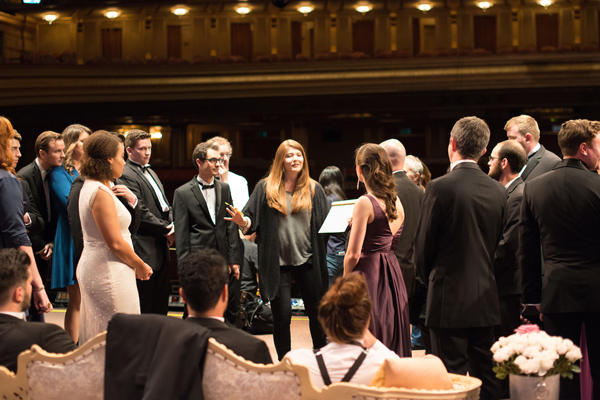
Aria working with the Merola Opera Program at San Francisco Opera in 2016.
Why did you pursue a residency with the Canadian Opera Company?
If I’m being super transparent and honest, I can’t take credit for pursuing the residency. I owed Nina Draganic a proposal for potential workshops that Amplified Opera could facilitate for the members of the Ensemble Studio. I was late in submitting that proposal because I had a bad case of writer’s block. We are still developing our own methodology, and I wasn’t really sure what Amplified Opera could reasonably hope to achieve in a few sessions.
Then one day Liz Upchurch called me and gave me what can only be described as a “Friday Night Lights-esque” locker room talk (you know, “Clear eyes. Full hearts. Can’t lose!”). She encouraged me to dream bigger than a couple of workshops, put everything Amplified Opera hopes to accomplish down on paper, and advised me to outline how a partnership between the two organizations might play out. I remember calling Asitha, Marion and Teiya in a panic because suddenly the scope of what might be possible was infinitely larger than we had believed.
Long story short, it turns out there is a lot of overlap in what the COC and AO hope to achieve, and the impact we hope to make. Nina was extremely supportive of this new proposal and helped us refine it so it could be shared with the rest of the COC’s leadership. By the time the final version of the proposal was submitted, it felt like a natural fit.
Tell us about the name “Disruptor-in-Residence” - what’s the meaning behind it?
The name is borrowed from business theory. Specifically, from the concept of Disruptive Innovation. For those familiar with the theory, this is an admittedly imperfect application, but I think the name applies in two ways:
First, disruptors are smaller organizations with fewer resources who challenge incumbent organizations.
Second, disruptors are able to challenge incumbent organizations because they focus on audience segments that are either underserved or overlooked.
So we are here to challenge the COC. In naming the residency, we wanted to be clear that our role within the organization is not to maintain the status quo but to devise and test new methods of creation and dissemination. Our focus is to create pathways of access for audiences and artists who have been underserved and overlooked by this industry.
What this means is that Amplified Opera operates on the belief that there is immense value and appeal to opera and a case for sharing it with as many people as possible. We are looking for ways to facilitate participation in this amazing art form.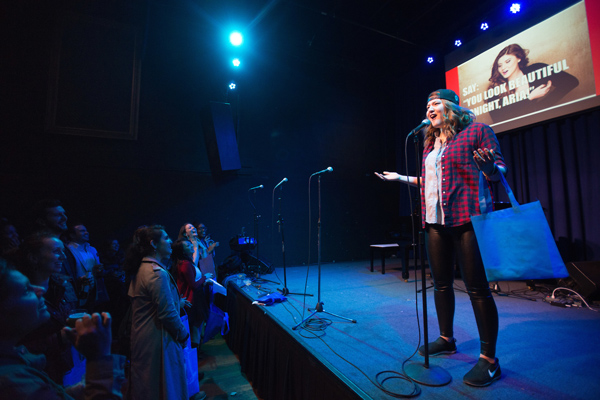
Aria on stage at the San Francisco OperaLab in 2017.
Amplified Opera has expressed a passionate interest in "decolonizing opera" –– could you tell us more about what that means for the company?
From my early days as the Artistic Director of Opera 5 to my time at San Francisco Opera where I curated off-site operatic events in nightclubs around the Bay Area, my career has been focused on bringing new audiences to opera. So I speak from a place of authority when I say there is a broad and genuine interest in opera.
However, my experience has also shown me that many people don’t feel welcome in the world of opera. Extraordinary artists who have enriched this artform with their immense talents are not valued for all they bring to the table. They do not feel like they are welcomed as they are, but conceal and bend elements of their identity to be palatable or marketable. Potential audience members feel alienated in our spaces, and similarly, feel like who they are is not welcome inside the opera house. Artists and audience members alike have noted that their communities are erased or misrepresented by our productions, and consequently feel there is no space for them to engage with opera authentically.
What barriers are preventing people from taking advantage of this amazing art form? In what ways have we created an environment where not everybody who is interested in exploring opera feels welcome and able to fully participate? Is this what we want our legacy to be?
Decolonizing opera means Amplified Opera is working to identify and remove those barriers - to create environments where everybody who is interested in opera has access to it as a means of expression and enjoyment. When this happens, our spaces will become richer and more fulfiling for everyone who chooses engage with them - not just for those whom we perceive as outside of the artform, but also for those of us who already love it.
What are you most looking forward to about this residency?
The co-founders at Amplified Opera have spent a lot of time talking about the importance of space. How the quality of the space we hold for each impacts the creative process. We are looking forward to taking a hard look at how we currently care for each other as colleagues in the opera world, and implementing new processes that allow everyone to bring their whole creative selves to every performance. I hope both the COC and Amplified Opera come away from our two years together with strategies to create work environments that are more collaborative and creative, and that the results of these processes are felt by those in the audience.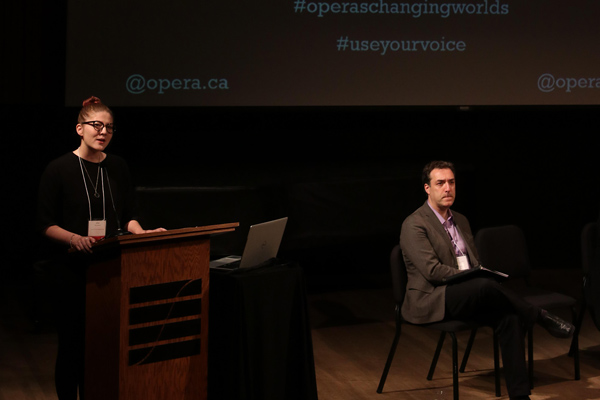
Aria presenting at the first-ever Summit on Education and Artist Training, "Opera's Changing Worlds".
What does opera’s future look like to you?
From where I'm standing the future of opera is vibrant, diverse, and bursting with creativity.
One silver lining of the pandemic is that it has allowed me to connect with colleagues all over the world. From St. John’s to Vancouver, from Hawaii to Iowa, from Italy to South Africa, and everything in between. So I feel confident in saying the good news is that the future of opera is incredibly bright. The even better news is that there are many futures for opera on the horizon, and they are all going to happen simultaneously (e.g. applications of technology, redefining performance practice, new works, old works presented in new ways, etc...). This isn't wishful thinking or speculation, this is an inevitability. In fact, there are so many extraordinary artists and administrators in every corner of this industry, that I'm feeling a bit sad that I can't point to each of them individually right now, and tell you about all the incredible things they're working on. You’ll just have to trust me when I say it’s all very, very inspiring.
You get the final word. Anything you’d like to add?
Just a reaction to the last question. I would love to add that the future of opera is in our own backyard. There are many amazing companies in Toronto doing inspiring work: Opera 5, FAWN Chamber Collective, OperaQ, LooseTea Theatre, Tapestry Opera, Against the Grain Theatre, Opera Atelier, and many more (don’t even get me started on the rest of Canada).
To give you a sense of how exciting this is, I have had the opportunity to work all across North America, and everywhere I go, when people find out that I am from Toronto, they ask me how it was possible for one city to produce so many exciting opera companies in such a short amount of time. The eyes of the opera world are on us. This is not only a testament to the amazing initiatives that are going on at the COC, but to the tireless work of the many artists in this city who are expressing themselves through this medium. If you love opera but haven’t had the chance to check out the full gamut of work that is being presented in this city, I’d encourage you to take advantage of everything that’s on offer.
Join Aria and the co-founders of Amplified Opera in our upcoming digital roundtable COC in Conversation: Gender & Opera –– March 5, 2021 at 7 p.m. ET.
Main photo: Hayley Andoff

